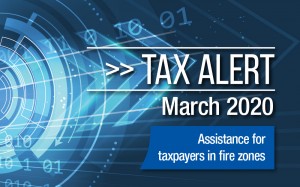
Autumn 2020
After an unprecedented summer of bushfires, we hope that Autumn brings cooler temperatures and soaking rain for all those who have been affected.
Data released in February give an early indication of how the Australian economy has been impacted by the bushfires and coronavirus, on top of the US-China trade war. The Reserve Bank of Australia lowered its near-term growth forecast for the year to June 2020 from 2.5% to 2.0%. New business investment fell 2.8% in the December quarter and 5.8% over 2019. Retail sales rose 0.5% in the normally super busy December quarter but were up just 0.3% over 2019, the slowest year on record. New vehicle sales were also sluggish, down 8.2% last year while the value of construction work done fell 7.4%. Consumers have perked up a bit since then, with the Westpac/Melbourne Institute consumer sentiment index up 2.3% in February.
Australian, US and European share markets all fell by more than 8% in February. Commodity prices also fell, although gold was up more than 5% due to its safe haven status. And the Aussie dollar dipped below US$66c, its lowest level since 2009.
Despite the economic challenges, the Australian corporate sector remains in good health. As the interim profit reporting season comes to an end, more than 90% of companies reported a first half profit (although a bare majority lifted profits), while record numbers issued dividends.
The low dollar, a rise in unemployment to 5.2% in January, annual wage growth stuck at 2.2% in the December quarter and sluggish economic growth make another cut in official interest rates more likely.
Hold on… bumpy markets ahead
After period of optimism, global investment markets have hit the panic button on fears about the possible economic impact of the coronavirus (COVID-19).
At times like these, it’s good to get some perspective.
Australian shares rose 24 per cent last year, touching record highs, and 10 per cent a year over the past seven years. Global shares rose 28 per cent last year and 17 per cent over the past seven years.i After such a good run, many observers have been saying shares were looking fully valued and that a correction was likely.
The thing with market corrections is that it is impossible to predict what will trigger them or how long and severe they will be.
Avoid knee-jerk reactions
At this point, markets are responding to uncertainty. Nobody knows what the extent of the economic fallout will be, so the temptation is to bail out of shares and put your cash in the bank. Or jump ship and switch to a ‘safer’, more conservative option in your superannuation fund.
While the urge to act and protect your savings is understandable, knee-jerk reactions can be a mistake.
It’s near impossible to time the markets. Not only do you risk selling when prices are near rock-bottom, but you also risk sitting on the sidelines during as the market recovers. As history tells us it always does.
In an ever-changing world, the basics of investing stay the same. By sticking to some timeless rules it’s much easier to avoid emotionally driven reactions and focus on your investment horizon.
Have a plan
Investing is a lifelong journey and like all journeys you are more likely to reach your destination if you plan your route. Without a plan, it’s easy to be distracted by the latest market worries and short-term price fluctuations.
Think about your personal and financial goals and what you want to achieve in 1,5,10, 20 years’ time. Be specific, put a dollar figure on your goals and plan how to reach them.
Low risk comes with lower returns
Many people are wary of investing in shares because of the perceived risks. Growth assets such as shares and property do entail higher risk than cash in the bank, but they also deliver higher returns in the long run.
Perhaps the biggest risk of all is not earning the returns you need to achieve your goals. While domestic and international shares produced stellar returns last year, cash returned just 1.5 per cent which was below the level inflation. Cash returns were not much better over the past seven years, averaging 2.2 per cent a year.
Spread your risk
Shares, property, bonds and cash all have good years and bad. While shares and property tend to provide the highest growth over time, there will be years when prices fall or go sideways. In some years, bonds and even cash produce the best returns.
A good way to reduce volatility and enjoy smoother returns over time is to diversify your investments across and within asset classes. That way, one bad investment or difficult year won’t sink your ship.
The most appropriate mix will depend on your age, the timing of your goals and your risk tolerance. You will need cash for emergencies and short-term goals, with enough money in growth assets to last you through your retirement.
Let your savings grow
The effect of compound interest is often referred to as magic, but there’s no trickery involved. Better still, it requires no work on your part, just the willpower to reinvest the income you earn on your investments, so you earn interest on your interest.
Rather than sell shares in quality companies in a panic, you could continue to collect your share dividends and reinvest them in more shares or other quality assets. This way, you avoid crystallising short-term paper losses and benefit from the inevitable market recovery.
That’s the simple but powerful concept behind superannuation which locks away your savings and all investment earnings until you retire.
When fear is driving markets, it’s important to get back to basics and think long term. If you would like to discuss your overall investment strategy, don’t hesitate to get in touch.
i https://www.chantwest.com.au/resources/2019-a-standout-year-for-super-funds
Tax Alert March 2020
The ATO is providing taxpayers in bushfire areas with more time to get their tax affairs in order, but at the same time it’s getting tough on employee car parking benefits and investigating lifestyle assets owned by wealthy taxpayers.
Here’s a roundup of some of the latest developments when it comes to tax:
Deferrals for taxpayers affected by bushfires
In the wake of this summer’s devastating bushfires, the ATO has announced it will be automatically deferring any lodgments or payments that taxpayers in bushfire-impacted postcodes are due to make.
Deferral will apply to income tax, activity statement, fringe benefits tax (FBT) and excise return lodgments and any associated payments, with the new deadline being 28 May 2020. Refund payments will be prioritised.
If you are affected by the bushfires but don’t live in a postcode on the ATO’s list, phone its Emergency Support Infoline on 1800 806 218. The service can also assist with re-issuing tax returns and activity statements, re-constructing your tax records and setting up payment plans.
Super obligations also delayed
SMSFs in bushfire zones have also been given extra time to meet their lodgement and compliance obligations.
The deferral applies to SMSF members and trustees living in an affected postcode, even if your SMSF’s address is not in these areas.
Employers in bushfire zones are still required to meet employee super guarantee (SG) obligations by the due date. SG charges for late SG payments will not be waived.
More employers up for FBT on car parking
The ATO has released a new draft interpretation of the FBT legislation that could see more businesses paying FBT if they provide employees with car parking benefits.
Draft Taxation Ruling TR 2019/D5 is due to commence on 1 April 2020 and replaces the former ruling, which was in place for over 20 years.
Under the ATO’s new interpretation, if your staff car parking facilities are both in the vicinity of your business and within 1 kilometre of a car park that offers all-day parking as a ‘commercial’ car park for FBT purposes, you may have to pay FBT on the value of your employees’ car spaces – even if they were tax-free before. A car park can be commercial for FBT purposes even if its fee structure discourages all-day parking by charging a higher fee.
If your business is near a shopping centre, hospital or airport for example, you should review your obligations prior to the new FBT year.
ATO collecting details on lifestyle assets
Taxpayers with ‘lifestyle assets’ like yachts, thoroughbred horses, expensive cars and fine art are likely to find themselves under the tax man’s microscope after the ATO requested five years of policy details from insurers.
Over 30 insurers have been asked to provide details of assets over certain value thresholds for use in the ATO’s data matching program.
Valuations of assets owned by around 350,000 taxpayers will be added to the ATO’s database, providing it with a more complete picture of a taxpayer’s actual financial situation. Although the information will not be used to start automated compliance activities, it will be used for risk profiling purposes.
Early release of super on ATO radar
The tax man is once again warning taxpayers that withdrawing your super savings before a condition of release is met is illegal.
If you are approached by someone promoting a scheme offering early release of your super benefits, the ATO is asking you to contact it on 13 10 20.
CGT blow for non-resident property owners
Property owners who are non-residents for tax purposes are no longer eligible for the main residence exemption (MRE) for capital gains tax (CGT) when they sell their home.
Under new legislation, the MRE is now denied to non-resident taxpayers if they dispose of a property purchased after 9 May 2017, unless certain life events occur within six years of becoming a foreign resident for tax purposes.
For homes purchased prior to 9 May 2017, non-resident taxpayers only have until 30 June 2020 to sell their former home if they do not want to pay full CGT on the capital gain made since the original property purchase.
Hatching your nest egg early
The summer bushfires have touched the lives of all Australians. For individuals who lost homes, businesses or livelihoods, the financial hardship lingers, prompting many to ask whether they can dip into their super to tide them over.
The short answer is generally no. According to the Australian Taxation Office (ATO), there are very limited circumstances where you can access your super early, mostly related to specific medical conditions or severe financial hardship.
Before we discuss these special circumstances, let’s look at when you can legally access your super under normal conditions.
Accessing super before age 60
Under superannuation law, there are strict rules around when you can start withdrawing your super.
The first hurdle is reaching what is referred to as your preservation age. Once you reach your preservation age – between age 55 and 60 depending on the year you were born – and retire, you can access your super in a lump sum or as a pension. But as a disincentive to early retirement, there may be tax to pay.
Even if you keep working, once you reach preservation age you can access a portion of your super by starting a transition to retirement pension. This can be an effective way to scale back your working hours while supplementing your reduced wages with income from super.
However, you can only access 10 per cent of your pension account each year. You pay tax on the taxable portion of pension income at your marginal rate less a 15 per cent offset. Earnings on assets supporting your pension are taxed at the normal super rate of 15 per cent.
Accessing super from age 60
From age 60, you can access your super tax free provided you are no longer working. And once you turn 65 you can access your super tax free even if you haven’t retired.
Anyone who has suffered financial hardship as a result of the bushfires and has already reached their preservation age could dip into their super under the normal rules, provided they retire or start a transition to retirement pension.
But what about people who don’t qualify under the normal rules? That’s where the early access rules governing severe financial hardship or compassionate grounds come in.
Severe financial hardship
There’s no question the recent bushfires have caused severe financial hardship for many people in the community. But for superannuation purposes, the definition of hardship will mean few people can use it to gain early access to their super.
You can gain access to at least part of your super as a lump sum if:
- You have been receiving certain government income support payments continuously for at least 26 weeks, and
- You are unable to meet your reasonable and immediate family living expenses.
Even then, you can only receive a maximum payment of $10,000 a year before tax.
If you have reached your preservation age plus 39 weeks, you may be able to access your entire super balance as a lump sum or pension (as opposed to 10 per cent of your balance each year with a transition to retirement pension) if:
- You are employed for less than 10 hours a week, and
- You have received government income support payments for at least 39 weeks since reaching preservation age.
Access on compassionate grounds
You may be able to take some money out of super early on compassionate grounds but, once again, strict rules apply. The money can only be taken as a lump sum and used to cover unpaid expenses including:
- Medical treatment or transport for you or one of your dependents, but only for a chronic or life-threatening illness not available through the public health system,
- Modifications to your home or vehicle to accommodate a severe disability,
- To prevent foreclosure on your mortgage if your lender threatens to repossess or sell your home.
Unfortunately, the rules governing early access make it extremely difficult to qualify. That’s because super is meant to be used for the sole purpose of providing retirement income.
If you would like to discuss when and how you can access your super, under the normal rules or due to special circumstances, please give us a call.



